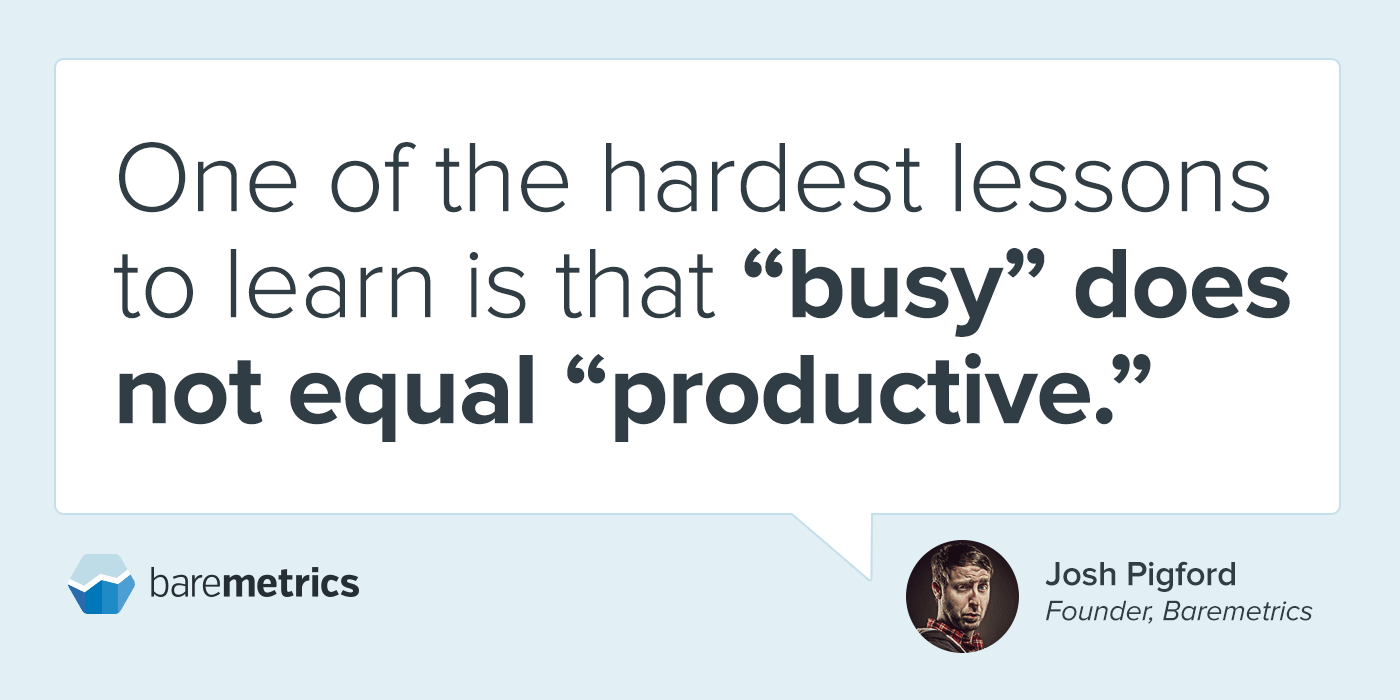I’ve been working now for close to a decade and a half. One major thing that people always miss: busy doesn’t mean productive.
I write about the idea of “busy” vs. “productive” a lot, actually. To wit, here’s three examples:
- Only about 10 percent of Americans can balance ‘being busy’ and ‘being happy’
- Why do you keep telling me how busy you are?
- You’re not nearly as busy as you think you are
In reality, the whole ‘busy doesn’t mean productive’ — NO WAIT, BUSY IS PRODUCTIVE!! — argument/discussion comes from the intersection of these two essential points about having a job:
- Most people focus more on quantity of work than quality of produced work
- Being busy feels the same way as being high to most people
At that intersection — between ‘busy as a drug’ and ‘quantity over quality’ — what happens is that employees, devoid of true purpose in their work as their senior managers rush from revenue-centric meeting to financial metrics conference call No. 7,182, assume “Well, if I’m doing a lot, I must be valuable…” That leads to “Busy must mean productive…”
In reality, busy doesn’t mean productive. Here’s why.
Busy doesn’t mean productive: The intersection of success and stress
Written a little bit before about the research work of Emma Seppala at Stanford; I managed to tie her research into the promotion of asshole bosses, which is someplace she probably never intended it to go.
Anyway, she’s promoting her new book — about happiness at work, naturally — over at Wharton’s website, and here’s an insanely good quote about the intersection of stress and success:
We believe that we can’t have success without stress. Many of us even count on that adrenaline that comes from over-caffeinating ourselves, over-scheduling ourselves, waiting until the last minute to get things done, because we believe that will make us more productive. But if you really look at the data, what long-term stress does, and we’ve probably all heard this so much, is that it really impairs not only our physical health but even our cognitive faculties, like our attention and memory, not to mention our emotional intelligence, our ability to communicate with other people in effective ways.
This couldn’t be more true. For better or worse, most of the top rungs of the business world are occupied by Type-A target-chasers. Those are people who believe everything is go go go and fiscal metrics and KPIs and CAGR and ROI and gotta run to my 2:30! They’re always stressed, but by definition … that stress makes them successful.
Right?
Wrong.
Here’s what that stress five-seven days a week over deliverables really does:
- Worse attention (yep)
- Worse memory
- Worse emotional intelligence
- Worse ability to communicate
If you add up attention (understanding what people are saying), memory (remembering it), emotional intelligence (relating to others), and communication (providing clarity), those four things together pretty much are the entirety of work when done right.
And yet, when you’re screeching about how busy you are all the time, you basically can’t do any of the four that effectively.
Busy doesn’t mean productive.
Busy doesn’t mean productive: A new definition of success
Here’s the societal problem, best I can tell: our definitions around what ‘success’ means are totally fucked up beyond belief. Most people think it means some combination of this:
- Make a good salary
- Seen as important at work / always on the clock
- Nice house
- Nice car
- Hot spouse
- Children
- In the right clubs / memberships
- Good friends
[Tweet “What if our definition of success changed?”]
Some of those things are important, for sure — in a capitalism, your salary is important, even if people always downplay it in surveys. (Funny thing about that, of course, is that 97 percent of people have no real idea what their salary even represents.)
Now let’s pause and pivot. What if our definition of success changed? What if the ideas were around…
- Having strong relationships with friends and family
- Raising kids right if you choose to have kids
- Getting home at 6pm every day and shutting off the work e-mails
- Reducing screen time
- Focusing on quality of deep work and not quantity of shallow work (for more on deep work vs. shallow work)
- Friendships, relationships, and contentment/happiness define success, as opposed to quantifiable bank account metrics
This would be hard for most people, no doubt — especially those Type-A target-chasers I referenced above. But if you truly want to understand that busy doesn’t mean productive, you need to redefine how you look at success.
Busy doesn’t mean productive: Quantity focus kills strategy
Daily deliverables — i.e. tasks — murdered any idea of strategy in most organizations. Here’s what happens at most jobs if you approach someone with decision-making authority about a new idea, or a ‘strategic outlook’ issue:
“Sounds great, Tom! No time, though! Running to my 3:15!”
It’s all about tasks and quantity. It’s all about deliverables and immediate goals. ‘Strategy’ kinda becomes the redheaded stepchild in that situation. How is that good for the long-term health of an organization and its business modeling?
Here’s the other thing that often happens in a ‘busy must mean productive’ culture: all the ‘strategy’ discussions are clustered at the top levels, and not throughout the organization, because the assumption is inherently, “Well, the middle and low levels have no time for this … they’re so busy! Love a good worker bee!” ( ** Lights cigar with $100 bill, laughs ** )
Task work is a part of any job, yes — and a large one, too. (Tasks make up strategy.) But until you learn to move past deliverables BS and align strategy with execution, you’re mostly running in circles.
It’s hard to do that unless you realize busy doesn’t mean productive.
